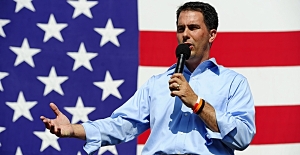The big cheese: Wisconsin governor election the one to watch, pundits say

By M.D. Kittle | Wisconsin Reporter
MADISON, Wis. — While all eyes this election day will be on the U.S. Senate and a handful of states that hold the balance of congressional power in their ballots, Wisconsin’s tight gubernatorial race might just prove to be the most important election in the nation.
Conservatives see a win by Republican Gov. Scott Walker as more than just a victory for arguably the most right-minded reforms in the country. Liberals, big labor in particular, see a triumph by Democratic challenger Mary Burke as sweet, sweet payback for Walker’s Act 10, the law that put more power back into the hands of taxpayers and decimated the ranks of government employees choosing to pay union dues — in the state that pioneered public-sector collective bargaining.
CRITICAL ELECTION: Gov. Scott Walker on the campaign trail. Some election watchers see Wisconsin’s race for governor as potentially the most important race in the nation, with the outcome determining whether other Republican governors will have the spine to push controversial reforms, as Walker has.
For conservative governors and lawmakers, a Walker win — it would be his third in four years thanks to a bitter, big-labor bankrolled recall campaign in 2012 — is about direction and courage. A Walker win tells even the most milquetoast Republican governor out there that you can push bold reforms, and you can politically survive.
“Walker represents not just the future of Wisconsin, but the future of our party and the future of people that make promises and keep promises, and whether they can be rewarded for doing those things,” Republican National Committee Chairman Reince Priebus told Slate.com in a piece, published Sunday under the headline, “The most important race in America.”
“In my mind, if Scott Walker loses, it’s a bad election cycle even if there are big wins everywhere else,” Phil Kerpen, head of the fiscal conservative advocacy organization American Commitment, told Slate, “because the impact on public policy will be more negative than any political upside elsewhere.”
On the left, a Walker victory is viewed in political sky-is-falling terms.
“(If) Walker wins re-election, Republicans in Washington will almost certainly take it as an invitation to double-down on Walker’s slash-and-burn tactics on a national level,” the liberal New Republic warned in August. “What Walker has done in Wisconsin, after all, isn’t just make it harder for union members to bargain for higher wages — something conservatives see as a worthy end in itself. He’s effectively defunded a key Democratic constituency, something Republican partisans around the country are keen to replicate, and that even the national Republican Party has experimented with in limited ways.”
That’s certainly one way of looking at it.
Walker’s message, to conservatives, transcends boilerplate budget trimming, something the first-term Republican didn’t really do in his last, less-austere budget. It’s about ending what conservatives, particularly tea party-types, see as an ever-growing dependency on government.
REVENGE CANDIDATE: The left sees a win by Democrat Mary Burke as sweet revenge for Walker’s conservative reforms.
That was the message Walker delivered when he rejected “free” federal money to expand Medicaid, much to the outrage of liberals, including his Democratic opponent.
“We will continue to look out for those legitimately in need of our help,” Walker said in a statement. “I will continue to work with able-bodied, working-age adults to help them transition from government dependence to true independence.”
Patrick Gleason, director of state affairs at Americans for Tax Reform, told Slate that if Walker loses it “will scare a lot of governors across the country” from following a more limited government approach to governance.
“That will send a message: Don’t do this, because you very well might not survive,” Gleason told the publication. “If Walker prevails, it’s going to embolden a lot of governors and lawmakers across the country. You’re going to see a lot of governors and lawmakers in other states get spines—or get stronger spines—than they had prior to Walker’s re-election.”
Should Walker lose, writes Noam Scheiber in the New Republic, “you could imagine the GOP being somewhat chastened, even with complete control of Congress.”
Walker’s government dependency talk is just so much political schtick, designed with an eye on the White House in 2016, his critics contend.
But Walker doesn’t have a legitimate chance to make a presidential run, pundits insist, if he doesn’t win his home state Tuesday. Another reason why Wisconsin’s gubernatorial race might just be the most important election this season.
“Wisconsin is where it’s at these days, whether or not progressives go all in,” Scheiber concludes.







